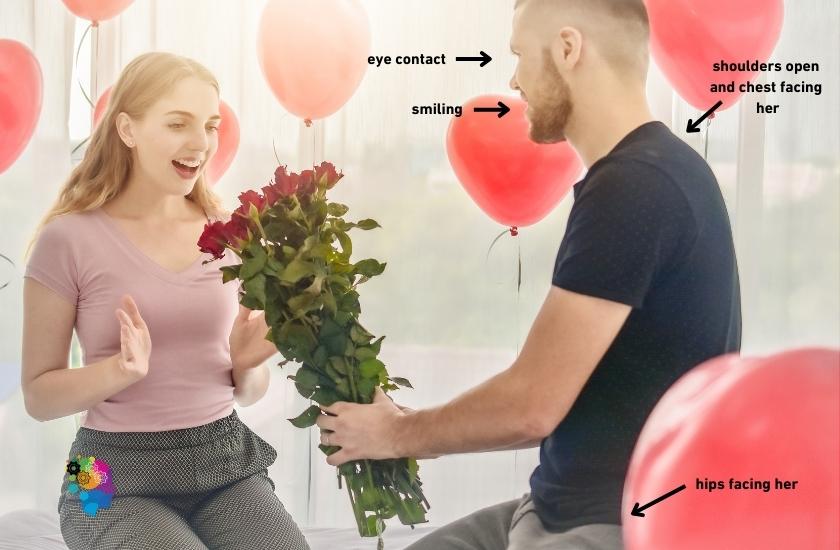Trauma Responses In Relationships: The Importance, Types & Effects
Trauma responses in relationships are a complex challenge many of us face, significantly impacting how we connect with our partners. These responses can make us feel overwhelmed, detached, and uncertain, whether stemming from a single traumatic event or multiple experiences.
Such experiences might lead to feelings of helplessness, confusion about supporting a partner, or guilt over not fully understanding their situation. Fortunately, there are ways to strengthen your relationship and build resilience to cope with these difficult emotions.
Did you know? If you start healing from your trauma, you'll feel less anxious. We suggest reading 12 Signs You Are Healing From Trauma to learn more about this.

Definition of trauma and its impact on relationships
Pubmed's study Introduction to Trauma and Traumatic Stress Reactions states that trauma is a challenging experience that can significantly affect a person's life. It might be an event that occurs all at once, like a car accident, or it can occur gradually over time, like bullying at school.
Traumatic events can leave a person terrified or upset and make it difficult for them to feel safe and content. A traumatic event can have an impact on a person's connections with other individuals as well. They could struggle to feel comfortable around or trust others.
They can also work to restrain their emotions or respond coolly.
With someone who has gone through trauma, it's crucial to be patient and to understand someone who has gone through trauma while attempting to make them feel safe and supported.
Types of trauma;
- Emotional trauma [eg. abusive relationships from parents]
- Relationship trauma [eg. an abusive partner]
- Childhood trauma [eg. serious injury has a child or sudden death in family]
Vital statistics that will give you perspective
- According to the World Health Organization (WHO), 35% of women globally have experienced non-partner sexual assault or intimate relationship violence that was physical and sexual.
- According to research by the Substance Abuse and Mental Health Services Administration (SAMHSA), those who have suffered intimate partner abuse are more likely than non-victims to experience post-traumatic stress disorder (PTSD), despair, and anxiety symptoms.
- Social Solutions reports that 1 in 3 women (35.6%) and 1 in 4 men (28.5%) in the U.S.
- According to a National Library Of Medicine study, those who were abused or neglected as children are more likely to experience mental health issues such PTSD, sadness, and anxiety.
Children who witness domestic violence are more likely to experience behavioral and emotional issues, such as despair, anxiety, and aggression, according to OASH.

The importance of understanding and managing trauma responses in intimate partnerships
Trauma can impact a person's thoughts, feelings, and behavior, as Pubmed's study Understanding the Impact of Trauma explains. The term "trauma response" refers to this. Since these reactions can be challenging for both partners in a relationship, those in intimate relationships must make an effort to understand and manage them.
It may be challenging for the other person to know how to assist or support the other person if they are experiencing trauma response difficulties. Additionally, it could result in misunderstandings or disputes. Both parties in a relationship can cooperate to help one another and forge closer ties by comprehending and controlling trauma responses.
It's crucial to remember that recovering from trauma takes time, and it's acceptable to contact an adult you can trust or a professional for assistance.

The Different Types of Trauma Responses in Relationships
In partnerships, there are numerous forms of trauma reactions that might take place. These reactions are the body's and mind's attempts to deal with the challenging feelings and memories associated with trauma. Typical responses include:
Responses of fight, flight, or freeze
Following a traumatic event, a person's body will either fight the threat, escape from it, or freeze in place, as explained by Simple Psychology. Conflict, withdrawal, or overburden may manifest in a relationship.
Avoidance or dissociation
Pubmed's study Trauma-Related Dissociation and the Dissociative Disorders reports some people may make an effort to block out or dissociate from their traumatic experiences. The term for this is dissociation. This may manifest in a relationship as avoiding particular topics or circumstances that trigger traumatic memories.
Flashbacks or intrusive thoughts
Abusive victims will often have flashbacks of their past trauma. It's referred to as a flashback in Pubmed's study, Intrusive memories of trauma. This may manifest in a relationship as emotional outbursts or problems with intimacy.
It's crucial to remember that these are normal reactions to trauma and do not indicate a person is frail. It is possible to control these reactions and develop resilience in the face of challenging emotions with time and assistance.

The effects of trauma on relationships
The relationships in a person's life can be significantly impacted by trauma. According to Understanding the Impact of Trauma, the following are some typical results of trauma on relationships:
Having trouble with intimacy and trust
Trauma survivors may find it difficult to trust others, especially when they are in a close relationship. They could think they can't be open or vulnerable or express their emotions, which can cause them to withdraw and feel alone.
Emotional separation
Trauma can make a person emotionally separate from others, making it difficult to develop healthy relationships. A person may find it challenging to experience intense emotions of love and compassion, which can lead to difficulties connecting with others.
Fear of abandonment
Trauma can make a person fear abandonment, which can make them overly reliant on others or shun meaningful relationships altogether. It makes it difficult for a person to feel close to others, which makes it challenging to start and maintain a committed relationship.
Communication problems
Trauma can make it difficult for a person to express their needs and feelings, making setting healthy boundaries hard. This can make communicating difficult and leave both partners feeling unheard or misunderstood.
Pro tip: To help you communicate with your partner, we suggest looking at The Highest Ranking Communication Books For Couples.
It's crucial to remember that these difficulties are typical for those who've experienced trauma, and they do not necessarily portend the end of the relationship - as explained in Pubmed's article, Understanding the Impact of Trauma. It is possible to overcome these difficulties and solidify your relationship with your spouse with time, patience, understanding, and support.
Strategies for navigating difficult emotions in intimate partnerships
It can be tough to manage the challenging feelings of being in a personal relationship with someone who has suffered trauma. It's acceptable to ask for assistance from a mental health professional. They can offer direction and service to both parties in the relationship.
According to Research Gate's study, Emotion Dynamics and Responsiveness in Intimate Relationships, these tactics could be helpful:
Communicate openly and honestly
Be honest and upfront with your lover about your feelings. Communicating your sentiments healthily and being receptive to your partner's ideas and emotions are critical.
Practice active listening
Engage in active listening and make an effort to comprehend your partner's viewpoint. This is not just listening to what your spouse is saying but also trying to understand where they are coming from and what emotions they could be experiencing.
Set boundaries
Establish limits and speak out about what you need. It's critical to be upfront about what you are uncomfortable with and to speak up when required.
Seek a mental health professional
Ask for expert assistance if necessary. Consider consulting a therapist or counselor for help if you're finding it challenging to manage challenging emotions in your relationship.
Make time for self-care
Spend time enjoying yourself and taking care of yourself. Maintaining your emotional well-being requires self-care, and doing things you want can improve your mood and lower your stress levels.
Did you know? One remarkable fact about yoga is that it has been shown to reduce the levels of cortisol, a stress hormone, in the body. Our Top Yoga Mats can help you get started.
Practice forgiveness
Try to let go of resentment and practice forgiveness. It's crucial to exercise forgiveness and let go of negative emotions because harboring bitterness can be detrimental to a relationship.
Prioritize and make time for intimacy
Make time and a priority for your partner's closeness and connection. Make time for intimacy and bond with your partner since maintaining these qualities is essential for a good relationship.
Using the abovementioned measures, you may foster a healing and supportive environment for both parties. Our The Best Self-Help Books can help you facilitate your healing.
Building Resilience and Connection in Trauma-Impacted Relationships
It may be challenging for someone who has endured trauma to feel a sense of community. However, it is possible to develop connection and resilience with the proper resources and assistance.
A study by Research Gate, Couple Resilience: Emerging Perspectives, shares tactics that could be useful:
Creating a network of allies
Enlarging yourself with allies who can provide love and understanding is critical. This could involve close friends, relatives, or a support network.
Practice empathy
Empathy is the capacity to comprehend and share another person's feelings. Developing empathy can promote connection and trust by making both parties feel heard and seen.
Create a safe environment
Trauma can cause people to feel unsafe, so it's crucial to establish a setting where both partners can open up about their feelings and experiences without worrying about being judged or rejected.
Practice mindfulness
The capacity to remain in the moment without passing judgment is mindfulness. Couples can strengthen their connection and resilience by practicing mindfulness techniques like yoga or meditation by being more present and conscious in their relationship.
Validate each other's experiences
Because trauma can be isolating, both partners must acknowledge and respect one other's feelings. The traumatized individual may feel heard and understood as a result of this.
Implementing these techniques may strengthen your trauma-impacted relationship's connection and resilience. Always be understanding and patient, and ask for help when you need it.
Conclusion
To sum up, trauma can have a substantial negative impact on relationships. But with the right resources and assistance, it is possible to work through challenging feelings and deepen your relationship with your spouse.
If this article was helpful to you, please visit our other blogs for additional advice and tools on dealing with trauma in relationships.
FAQ
How can a partner of someone with trauma support and understand their loved one?
By learning about trauma, its effects, and the potential symptoms their spouse may suffer, a partner of someone with trauma can help and understand their loved one. When their partner is having a hard time, they can be understanding, sympathetic, and nonjudgmental. It's crucial to keep lines of communication open and to develop a bond of trust with your partner.
References
- Pubmed: Introduction to Trauma and Traumatic Stress Reactions
- World Health Organization: Gender-Based Violence (Violence Against Women and Girls)
- Pubmed: Impact of Intimate Partner Violence on Women’s Mental Health
- Social Solutions: 20 alarming domestic violence statistics
- National Library Of Medicine: The Long-term Health Outcomes of Childhood Abuse
- OASH: Effects of domestic violence on children
- Pubmed: Understanding the Impact of Trauma
- Simple Psychology: Fight, Flight, Freeze, Or Fawn
- Pubmed's: Trauma-Related Dissociation and the Dissociative Disorders
- Pubmed's: Intrusive memories of trauma
- Pubmed: Understanding the Impact of Trauma
- Pubmed: Understanding the Impact of Trauma
- Research Gate: Emotion Dynamics and Responsiveness
- Research Gate: Couple Resilience: Emerging Perspectives






